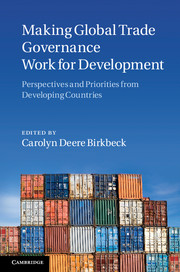 Making Global Trade Governance Work for Development
Making Global Trade Governance Work for Development Book contents
- Frontmatter
- Contents
- Figures
- Tables and boxes
- Contributors
- Acknowledgements
- Introduction
- Part I Global trade governance
- Part II Roles and responsibilities in global trade governance: diversity in developing country priorities and strategies
- Part III Strengthening multilateralism
- Part IV Making WTO negotiations and decision-making processes fairer
- 16 Towards fair and inclusive decision-making in WTO negotiations
- 17 Revisiting the single undertaking
- 18 Enhancing developing country participation in global trade governance through South–South coalitions in the WTO
- 19 Inclusive trade governance
- 20 Global trade governance and development
- Part V Conclusion
- Index
- References
19 - Inclusive trade governance
participation of stakeholders from the national to the multilateral level
from Part IV - Making WTO negotiations and decision-making processes fairer
Published online by Cambridge University Press: 07 September 2011
- Frontmatter
- Contents
- Figures
- Tables and boxes
- Contributors
- Acknowledgements
- Introduction
- Part I Global trade governance
- Part II Roles and responsibilities in global trade governance: diversity in developing country priorities and strategies
- Part III Strengthening multilateralism
- Part IV Making WTO negotiations and decision-making processes fairer
- 16 Towards fair and inclusive decision-making in WTO negotiations
- 17 Revisiting the single undertaking
- 18 Enhancing developing country participation in global trade governance through South–South coalitions in the WTO
- 19 Inclusive trade governance
- 20 Global trade governance and development
- Part V Conclusion
- Index
- References
Summary
National trade policy is an important determinant of the production and trade structure of any country. In turn, national trade policy development and implementation take place within the context of international trade-related agreements (i.e. bilateral, regional and multilateral). The scope of these agreements, and hence trade policy, nowadays goes far beyond issues of customs duties at the border. As trade agreements cover an increasing diversity of ‘behind the border’ aspects of trade regulation, they now impact the economic choices available to all groups of producers and consumers in the country, whether directly engaged in international trade or not. This chapter argues that it is critically important that the instruments of trade governance – national trade policy as well as international trade agreements – are developed through an inclusive process that ensures the participation of all relevant stakeholders.
The analysis presented in this chapter draws on the author’s work on trade-related issues over fifteen years. This experience has encompassed working with a range of stakeholders from developing countries to build their capacity for development-oriented national trade policy-making as well as more effective participation in the World Trade Organization (WTO) negotiations.
- Type
- Chapter
- Information
- Making Global Trade Governance Work for DevelopmentPerspectives and Priorities from Developing Countries, pp. 529 - 551Publisher: Cambridge University PressPrint publication year: 2011
